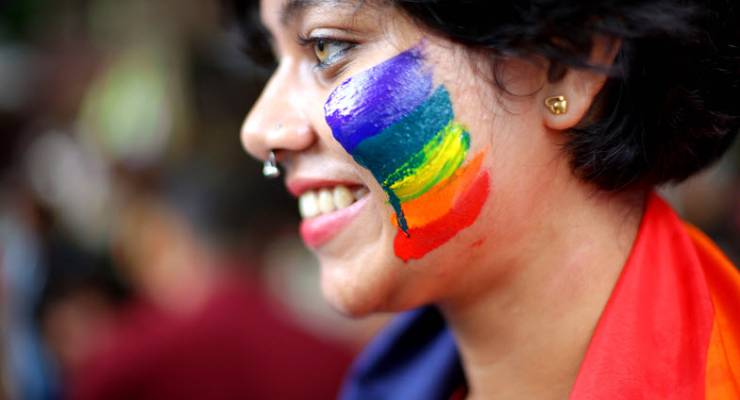
In a landmark, long overdue decision, India’s Supreme Court yesterday unanimously ruled to decriminalise homosexuality. The decision, which follows decades of lobbying and failed legal challenges by activists, found that Section 377 of the Indian Penal Code, a 157-year-old colonial-era law that prohibits sexual relations “against the order of nature”, was unconstitutional.
While prosecutions under Section 377 were relatively uncommon, the law still had a normative impact on societal attitude, while also creating the opportunity for widespread harassment and blackmail of LGBTIQ people.
Where is homosexuality illegal?
India’s Supreme Court decision means there are now 71 countries around the world where homosexuality is illegal. The overwhelming majority of these countries are in Africa, Asia and the Middle East.
Much of this state-sanctioned homophobia shares a common genealogy. Several former British colonies across sub-Saharan Africa and South Asia have anti-sodomy laws similar to India’s now repealed Section 377, which were implemented in the 19th century as a means of imposing rigid Victorian social mores across the empire.
Indian Supreme Court Justice Rohinton Fali Nariman alluded to this history in yesterday’s decision, saying that there was no presumption of constitutionality for laws passed by a colonial foreign regime. Likewise, other countries that criminalise homosexuality, particularly in the Middle East, share criminal codes with a common basis in Sharia law.
Where does homosexuality attract the death penalty?
Homosexuality is punishable by death in 12 countries — Afghanistan, Brunei, Iran, Mauritania, Sudan, Saudi Arabia, Yemen, Qatar, Pakistan, and the United Arab Emirates as well as certain parts of Nigeria and Somalia. However, it is unclear how often, if ever, the death penalty is used in these countries.
While reports on executions are often unclear and riddled with misinformation, activist groups believe that only Iran and Saudi Arabia have used the death penalty in recent times. According to a 2016 survey of global sexual orientation laws conducted by the International Lesbian, Gay, Bisexual, Trans and Intersex Association, there is no evidence of its use in Mauritania, Pakistan, Qatar, UAE, or Afghanistan.
On the other hand, the report also highlighted situations where the death penalty was imposed by quasi-judicial vigilante bodies, such as courts set up by ISIS in Iraq and northern Syria.
Other punishment for LGBTIQ people
Of the countries that do criminalise homosexual acts, both punishment, and levels of enforcement vary greatly. Imprisonment and lashings appear to be the most commonly used forms of punishment.
In Malaysia, and Indonesia’s deeply conservative Aceh province, there have been several recent incidents of canings and lashings being carried out in public. Elsewhere, laws remain on the books, but are almost never enforced in practice. In Singapore, for example, the criminal code prohibits “acts of gross indecency”, yet the law is rarely applied to private, consensual sexual relationships.
In other countries, while homosexuality is not explicitly banned, other homophobic laws exists that greatly restrict LGBTIQ people’s ability to live a freely. In Egypt, where homosexuality is decriminalised, hundreds of gay men have been arrested as part of a recent crackdown on morality. Meanwhile, Russia recently passed laws banning propagandising non-traditional sexual relationships. The law is so broad and ill-defined that it could arguably be used to target anything from public displays of affection, to pride rallies.
Russia’s laws appear to be part of a broader suite of anti-LGBTIQ legislation spreading across eastern Europe. Croatia, Slovakia, Slovenia and Hungary all recently made changes to their definitions of marriage in order to restrict it to heterosexual couples.
The future
Yesterday’s decision represents a truly momentous victory for the global LGBTIQ movement, and for over 100 million Indians. In his judgment, Chief Justice Misra said, “it is only when each and every individual is liberated from the shackles of such bondage … that we can call ourselves a truly free society”.
Politicians across the world could do well to heed this advice.








“Russia’s laws appear to be part of a broader suite of anti-LGBTIQ legislation spreading across eastern Europe. Croatia, Slovakia, Slovenia and Hungary …”
Question (for anyone who knows, including the writer): is this a Church thing, since the latter countries all have big Catholic influence, or is this a right wing nationalism thing a la Putin where gay people are just another convenient “other” to be scapegoated?
Russia with the biggest population quoted above is not a Catholic country- the others in comparison have a miniscule population
Yes I noticed that a lot of these countries are…… catholic ???
“Afghanistan, Brunei, Iran, Mauritania, Sudan, Saudi Arabia, Yemen, Qatar, Pakistan, and the United Arab Emirates as well as certain parts of Nigeria and Somalia. ”
I asked the question specifically about the Eastern European countries, since the author described this as spreading across eastern Europe. The Islamic countries were already terminally gay-unfriendly, that’s not news.
At the same time India’s BJP government has placed a number of its critics under arrest.
Interesting, following the recent caning in Malaysia of two women for musahaqah -Lesbian “activity”, that this writer equates homosexuality with sodomy.
Sounds a bit like the apocryphal reason Sapphism was never illegal in Britain coz Vicky didn’t believe that it could exist and struck it out of the law to which she was graciously giving her imprimatur.
The line regarding the status of Singapore grossly understates the problem there. Being reminded quietly of ‘our suspicions’ won’t notch up an embarrassing statistic, but does chillingly have a similar affect. Singapore is just as menacing in this regard as Malaysia.